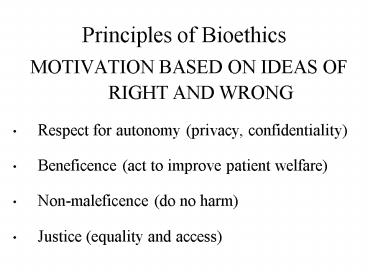Principles of Bioethics - PowerPoint PPT Presentation
1 / 15
Title:
Principles of Bioethics
Description:
... she tested positive for a gene mutation that increases her colon cancer risk. ... of colon cancer. Your risk can. be greatly reduced. with regular ... – PowerPoint PPT presentation
Number of Views:3590
Avg rating:3.0/5.0
Title: Principles of Bioethics
1
Principles of Bioethics
- MOTIVATION BASED ON IDEAS OF RIGHT AND WRONG
- Respect for autonomy (privacy, confidentiality)
- Beneficence (act to improve patient welfare)
- Non-maleficence (do no harm)
- Justice (equality and access)
2
Respect for Autonomy
A1.2.2
A persons right to choose freely, based on
adequate information, without coercion
3
Respect for Autonomy
- Marys father died at age 45 of Huntingtons
disease (HD). Her brother currently has started
to show symptoms of the disease at age 35. Mary
is now 33 and was referred by her family doctor
to the genetic counselor for HD genetic testing.
Mary has no children. - The genetic counselor explains the risks,
benefits and limitations of the test. The genetic
counselor describes the natural history of HD and
the fact that there are limited treatment options
and, unfortunately, no cure.
A1.2.2
4
Respect for Autonomy
- Mary explains the emotional difficulty in
watching her relatives struggle with the disease
and that she would only worry when the symptoms
would start if she knew she had HD. - The genetic counselor accepts Marys decision and
validates her choice.
A1.2.2
5
Beneficence
- Margaret meets with the genetic counselor after
learning she tested positive for a gene mutation
that increases her colon cancer risk. - She is concerned about this cancer risk and feels
overwhelmed about her future.
6
Beneficence
A1.2.2
7
Beneficence
- The genetic counselor explains the options for
cancer prevention with frequent screenings and
awareness. - Margaret tells the genetic counselor that she is
comforted by the fact that there are
8
Non-maleficence
- Do No Harm
- Sarah is a healthy 7-year old . Her mother was
recently diagnosed with breast cancer at age 35
which was found to be caused by a hereditary
breast cancer gene mutation. - Now that her treatments are complete, Sarahs
mother wants to know whether she has passed the
gene mutation to Sarah.
A1.2.2
9
Non-maleficence
A1.2.2
10
Non-maleficence
- The genetic counselors educates Sarah and her
mother about the hereditary breast cancer
syndrome. - She explains that children and adolescents are
not at risk for developing cancer, rather it
occurs in adulthood. - Additionally, Sarah is not capability of
providing informed consent given her age and
competency level.
A1.2.2
11
Non-maleficence
- The genetic counselor asks Sarah what she
understands about this test and Sarah does not
know what she would do, if anything, knowing her
genetic status at this time. - The genetic counselor explains to Sarah and her
mother that being aware of Sarahs genetic status
now, may inflict more worry than empowerment at
this time. - The genetic counselor recommends that Sarah have
testing when she is 18.
A1.2.2
12
Justice
- Legally and ethically treating all with respect
and due rights.
13
Common Ethical Issues for Families
- Right to know/right not to know
- Sharing of information
- Coercion
- Privacy
- Reproductive decision making
- Testing of minors
ASCO
14
Ethical, Legal, and Social Issues in Genetic
Testing Key Points
- Anticipate and discuss potential ethical, legal,
and social issues before testing - Encourage family involvement and a shared
approach to decision making - Take care to avoid coercion by relatives or
health care providers - Stay informed about state and federal laws to
prevent genetic discrimination and protect privacy
ASCO
15
- Some distinguish ethics, what is right or wrong
based on REASON, from morals, what is considered
right or wrong behavior based on SOCIAL CUSTOM.































